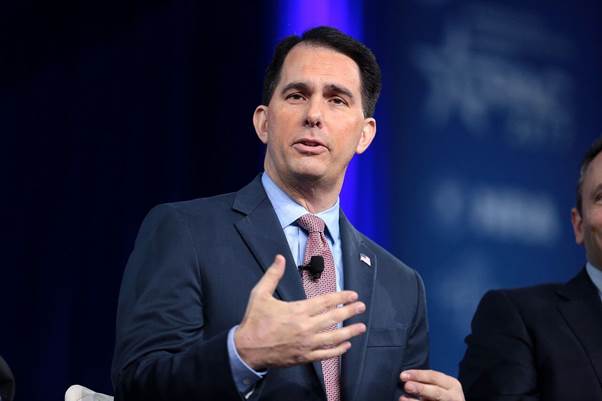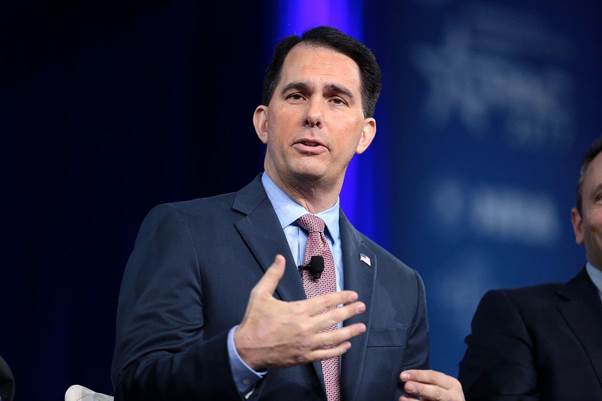Scott Walker, the former Governor of Wisconsin and one-time Republican presidential candidate, has been a familiar name in American politics for decades. Known for his controversial policies on public sector unions, budget reforms, and conservative governance, Walker carved out a national reputation as a fiscal conservative who wasn’t afraid of political battles.
Despite his high-profile career, however, Walker’s personal wealth is surprisingly modest. As of 2025, Scott Walker’s net worth is estimated at around $300,000—a figure far below the fortunes of many American politicians.
This article takes a deep dive into Scott Walker’s $300,000 net worth, examining his career earnings, financial struggles, assets, pensions, book deals, and life after politics. It also explores how his financial situation compares with other governors and political leaders, painting a clear picture of how someone with such a long political career could have such modest wealth.

Early Life and Education
Scott Kevin Walker was born on November 2, 1967, in Colorado Springs, Colorado. His father was a Baptist minister, and his mother worked as a bookkeeper. When Walker was young, the family relocated to Delavan, Wisconsin, where he grew up.
He attended Marquette University in Milwaukee but left in 1990 before completing his degree. Instead of finishing college, Walker pursued a career in politics and public service, a decision that would define his life both professionally and financially.
From a young age, Walker was deeply interested in conservative politics, volunteering for campaigns and interning with the state legislature.
Political Career and Rise to National Prominence
Early Career
Walker first ran for office in 1990 when he campaigned for a seat in the Wisconsin State Assembly. He lost that election but persisted, eventually winning a seat in 1993. He served in the Assembly for nearly a decade, earning a reputation as a reliable conservative voice.
Milwaukee County Executive
In 2002, following a local corruption scandal, Walker was elected as Milwaukee County Executive. This position gave him executive experience and allowed him to build a platform as a reformer, setting the stage for his gubernatorial run.
Governor of Wisconsin
Walker’s big break came in 2010, when he was elected as the 45th Governor of Wisconsin. He quickly became a national figure due to his aggressive reforms, especially his 2011 legislation that stripped collective bargaining rights from many public sector unions.
This move sparked massive protests and led to a recall election in 2012, which Walker survived—making him the first U.S. governor to win a recall election. His victory boosted his national profile, and he was often mentioned as a rising star in Republican politics.

Presidential Run
In 2015, Walker announced his candidacy for the Republican presidential nomination. Although he entered the race as a strong contender, his campaign fizzled quickly, and he dropped out after just 71 days. His short-lived campaign drained resources and left him with campaign debts, which added to his financial challenges.
Scott Walker’s Net Worth: $300,000
As of 2025, Scott Walker’s net worth is approximately $300,000. This figure is strikingly low compared to the fortunes of many American governors and former presidential hopefuls. For perspective, some of his peers—such as Mitt Romney, Jeb Bush, or Mike Pence—are worth millions.
So, why is Scott Walker’s net worth relatively modest? Let’s break it down:
Sources of Income
1. Government Salary
Walker spent nearly 30 years in public service.
- As Governor of Wisconsin (2011–2019), he earned around $147,000 per year, the standard gubernatorial salary.
- As Milwaukee County Executive, his salary was approximately $130,000 annually.
- During his time in the State Assembly, his salary was more modest, ranging from $30,000 to $50,000 per year depending on the era.
While these salaries were comfortable, they were not extravagant compared to the private sector—especially for someone in politics for decades.
2. Book Deals
In 2013, Walker published his memoir, “Unintimidated: A Governor’s Story and a Nation’s Challenge.”
- While the book sold reasonably well in conservative circles, it did not generate the kind of massive royalties seen by other politicians like Barack Obama or Hillary Clinton.
- Estimates suggest he earned in the low six figures from the deal, which helped supplement his income but was not enough to dramatically change his net worth.
3. Public Speaking
After leaving office in 2019, Walker joined the Young America’s Foundation (YAF) as President. YAF is a conservative youth organization, and his role reportedly pays him a six-figure salary. While this boosts his income, it came after years of relatively modest government earnings.
He has also delivered paid speeches, though his speaking fees are not on par with big-name politicians.

4. Pension and Retirement Benefits
As a long-time public servant, Walker is entitled to Wisconsin’s state pension plan, which adds stability to his finances. His pension, combined with retirement benefits, provides an important financial cushion even if it doesn’t dramatically increase his net worth.
Expenses, Debts, and Financial Challenges
One reason Walker’s net worth is relatively low is due to financial challenges he has faced:
- 2015 Presidential Campaign Debt: His failed presidential campaign reportedly left him with significant debts, which took years to repay.
- Family Expenses: Walker and his wife raised two sons and maintained residences in both Madison and Milwaukee, which added to household costs.
- Modest Investments: Unlike wealthier politicians who invest heavily in real estate, stocks, or private businesses, Walker did not amass large investment holdings.
Reports over the years have shown that Walker lived relatively close to his means, without large personal assets or extravagant wealth accumulation.
Assets
Scott Walker’s assets include:
- A family home in Wisconsin (valued in the mid-six figures).
- Retirement and pension accounts.
- Limited personal savings and investments.
Public disclosures suggest that most of Walker’s wealth is tied up in real estate and retirement funds, leaving him with limited liquid assets.
Comparison with Other Politicians
To put Walker’s $300,000 net worth in context:
- Mitt Romney (former governor & presidential candidate): ~$300 million.
- Jeb Bush (former governor & presidential candidate): ~$40 million.
- Mike Pence (former VP & governor): ~$4 million.
- Scott Walker: ~$300,000.
This contrast highlights how unusual it is for a major governor and presidential contender to leave office with such modest personal wealth.
Life After Politics
After leaving office in 2019, Walker did not fade into obscurity. Instead, he became President of Young America’s Foundation, one of the most prominent conservative youth organizations in the U.S.
In this role, he:
- Oversees conservative student programs and speakers.
- Manages the Reagan Ranch, which YAF owns and preserves.
- Advocates for conservative values on college campuses.
His position at YAF provides him with a stable six-figure salary, ensuring his financial stability even if his overall net worth remains modest.
Public Perception of His Finances
Walker’s relatively low net worth has become a talking point in political discussions. Critics argue that his modest wealth shows he lacked strong private-sector experience. Supporters, however, see it as proof that Walker was a genuine public servant who did not enrich himself through politics.
Unlike some politicians accused of using their positions for financial gain, Walker’s finances reflect a career built on salaries, modest royalties, and pensions, without significant outside enrichment.
Net Worth Timeline
- 1990s (State Assembly): <$100,000 net worth.
- 2002 (Milwaukee County Executive): ~$150,000.
- 2010 (Before Governorship): ~$200,000.
- 2015 (Presidential Run): ~$250,000 (but debts followed).
- 2019 (Leaving Office): ~$200,000 after campaign debts.
- 2025 (Current): ~$300,000, largely from YAF income and pensions.
Philanthropy and Charitable Work
Although not a billionaire philanthropist, Walker has supported causes consistent with his political ideology. He has worked with Christian organizations, youth programs, and conservative advocacy groups. His role at YAF itself is rooted in promoting education, leadership, and conservative values for the next generation.
Legacy: Financial and Political
Financially, Scott Walker’s $300,000 net worth underscores that not all politicians leave office wealthy. His story contrasts sharply with those who accumulate massive fortunes through books, speaking tours, or corporate boards.
Politically, Walker will be remembered for:
- His union reforms, which reshaped Wisconsin politics.
- His recall election victory, a rare moment in U.S. political history.
- His short-lived presidential run, which reflected both his national appeal and limitations.
Conclusion
As of 2025, Scott Walker’s net worth is estimated at $300,000. For a man who once stood on the national stage as a leading Republican figure, this figure may seem surprisingly low. Yet, it reflects a career defined not by wealth accumulation but by steady public service, modest living, and financial ups and downs.
Introduction
Scott Walker, the former Governor of Wisconsin and one-time Republican presidential candidate, has been a familiar name in American politics for decades. Known for his controversial policies on public sector unions, budget reforms, and conservative governance, Walker carved out a national reputation as a fiscal conservative who wasn’t afraid of political battles.
Despite his high-profile career, however, Walker’s personal wealth is surprisingly modest. As of 2025, Scott Walker’s net worth is estimated at around $300,000—a figure far below the fortunes of many American politicians.
This article takes a deep dive into Scott Walker’s $300,000 net worth, examining his career earnings, financial struggles, assets, pensions, book deals, and life after politics. It also explores how his financial situation compares with other governors and political leaders, painting a clear picture of how someone with such a long political career could have such modest wealth.

Early Life and Education
Scott Kevin Walker was born on November 2, 1967, in Colorado Springs, Colorado. His father was a Baptist minister, and his mother worked as a bookkeeper. When Walker was young, the family relocated to Delavan, Wisconsin, where he grew up.
He attended Marquette University in Milwaukee but left in 1990 before completing his degree. Instead of finishing college, Walker pursued a career in politics and public service, a decision that would define his life both professionally and financially.
From a young age, Walker was deeply interested in conservative politics, volunteering for campaigns and interning with the state legislature.
Political Career and Rise to National Prominence
Early Career
Walker first ran for office in 1990 when he campaigned for a seat in the Wisconsin State Assembly. He lost that election but persisted, eventually winning a seat in 1993. He served in the Assembly for nearly a decade, earning a reputation as a reliable conservative voice.
Milwaukee County Executive
In 2002, following a local corruption scandal, Walker was elected as Milwaukee County Executive. This position gave him executive experience and allowed him to build a platform as a reformer, setting the stage for his gubernatorial run.
Governor of Wisconsin
Walker’s big break came in 2010, when he was elected as the 45th Governor of Wisconsin. He quickly became a national figure due to his aggressive reforms, especially his 2011 legislation that stripped collective bargaining rights from many public sector unions.
This move sparked massive protests and led to a recall election in 2012, which Walker survived—making him the first U.S. governor to win a recall election. His victory boosted his national profile, and he was often mentioned as a rising star in Republican politics.

Presidential Run
In 2015, Walker announced his candidacy for the Republican presidential nomination. Although he entered the race as a strong contender, his campaign fizzled quickly, and he dropped out after just 71 days. His short-lived campaign drained resources and left him with campaign debts, which added to his financial challenges.
Scott Walker’s Net Worth: $300,000
As of 2025, Scott Walker’s net worth is approximately $300,000. This figure is strikingly low compared to the fortunes of many American governors and former presidential hopefuls. For perspective, some of his peers—such as Mitt Romney, Jeb Bush, or Mike Pence—are worth millions.
So, why is Scott Walker’s net worth relatively modest? Let’s break it down:
Sources of Income
1. Government Salary
Walker spent nearly 30 years in public service.
- As Governor of Wisconsin (2011–2019), he earned around $147,000 per year, the standard gubernatorial salary.
- As Milwaukee County Executive, his salary was approximately $130,000 annually.
- During his time in the State Assembly, his salary was more modest, ranging from $30,000 to $50,000 per year depending on the era.
While these salaries were comfortable, they were not extravagant compared to the private sector—especially for someone in politics for decades.
2. Book Deals
In 2013, Walker published his memoir, “Unintimidated: A Governor’s Story and a Nation’s Challenge.”
- While the book sold reasonably well in conservative circles, it did not generate the kind of massive royalties seen by other politicians like Barack Obama or Hillary Clinton.
- Estimates suggest he earned in the low six figures from the deal, which helped supplement his income but was not enough to dramatically change his net worth.
3. Public Speaking
After leaving office in 2019, Walker joined the Young America’s Foundation (YAF) as President. YAF is a conservative youth organization, and his role reportedly pays him a six-figure salary. While this boosts his income, it came after years of relatively modest government earnings.
He has also delivered paid speeches, though his speaking fees are not on par with big-name politicians.

4. Pension and Retirement Benefits
As a long-time public servant, Walker is entitled to Wisconsin’s state pension plan, which adds stability to his finances. His pension, combined with retirement benefits, provides an important financial cushion even if it doesn’t dramatically increase his net worth.
Expenses, Debts, and Financial Challenges
One reason Walker’s net worth is relatively low is due to financial challenges he has faced:
- 2015 Presidential Campaign Debt: His failed presidential campaign reportedly left him with significant debts, which took years to repay.
- Family Expenses: Walker and his wife raised two sons and maintained residences in both Madison and Milwaukee, which added to household costs.
- Modest Investments: Unlike wealthier politicians who invest heavily in real estate, stocks, or private businesses, Walker did not amass large investment holdings.
Reports over the years have shown that Walker lived relatively close to his means, without large personal assets or extravagant wealth accumulation.
Assets
Scott Walker’s assets include:
- A family home in Wisconsin (valued in the mid-six figures).
- Retirement and pension accounts.
- Limited personal savings and investments.
Public disclosures suggest that most of Walker’s wealth is tied up in real estate and retirement funds, leaving him with limited liquid assets.
Comparison with Other Politicians
To put Walker’s $300,000 net worth in context:
- Mitt Romney (former governor & presidential candidate): ~$300 million.
- Jeb Bush (former governor & presidential candidate): ~$40 million.
- Mike Pence (former VP & governor): ~$4 million.
- Scott Walker: ~$300,000.
This contrast highlights how unusual it is for a major governor and presidential contender to leave office with such modest personal wealth.
Life After Politics
After leaving office in 2019, Walker did not fade into obscurity. Instead, he became President of Young America’s Foundation, one of the most prominent conservative youth organizations in the U.S.
In this role, he:
- Oversees conservative student programs and speakers.
- Manages the Reagan Ranch, which YAF owns and preserves.
- Advocates for conservative values on college campuses.
His position at YAF provides him with a stable six-figure salary, ensuring his financial stability even if his overall net worth remains modest.
Public Perception of His Finances
Walker’s relatively low net worth has become a talking point in political discussions. Critics argue that his modest wealth shows he lacked strong private-sector experience. Supporters, however, see it as proof that Walker was a genuine public servant who did not enrich himself through politics.
Unlike some politicians accused of using their positions for financial gain, Walker’s finances reflect a career built on salaries, modest royalties, and pensions, without significant outside enrichment.
Net Worth Timeline
- 1990s (State Assembly): <$100,000 net worth.
- 2002 (Milwaukee County Executive): ~$150,000.
- 2010 (Before Governorship): ~$200,000.
- 2015 (Presidential Run): ~$250,000 (but debts followed).
- 2019 (Leaving Office): ~$200,000 after campaign debts.
- 2025 (Current): ~$300,000, largely from YAF income and pensions.
Philanthropy and Charitable Work
Although not a billionaire philanthropist, Walker has supported causes consistent with his political ideology. He has worked with Christian organizations, youth programs, and conservative advocacy groups. His role at YAF itself is rooted in promoting education, leadership, and conservative values for the next generation.
Legacy: Financial and Political
Financially, Scott Walker’s $300,000 net worth underscores that not all politicians leave office wealthy. His story contrasts sharply with those who accumulate massive fortunes through books, speaking tours, or corporate boards.
Politically, Walker will be remembered for:
- His union reforms, which reshaped Wisconsin politics.
- His recall election victory, a rare moment in U.S. political history.
- His short-lived presidential run, which reflected both his national appeal and limitations.
Conclusion
As of 2025, Scott Walker’s net worth is estimated at $300,000. For a man who once stood on the national stage as a leading Republican figure, this figure may seem surprisingly low. Yet, it reflects a career defined not by wealth accumulation but by steady public service, modest living, and financial ups and downs.
Walker’s financial profile sets him apart from many of his political peers, illustrating that high political office does not always translate into personal fortune. His story is one of political prominence without great wealth, a reminder that influence and legacy in politics are not always measured in dollars.

